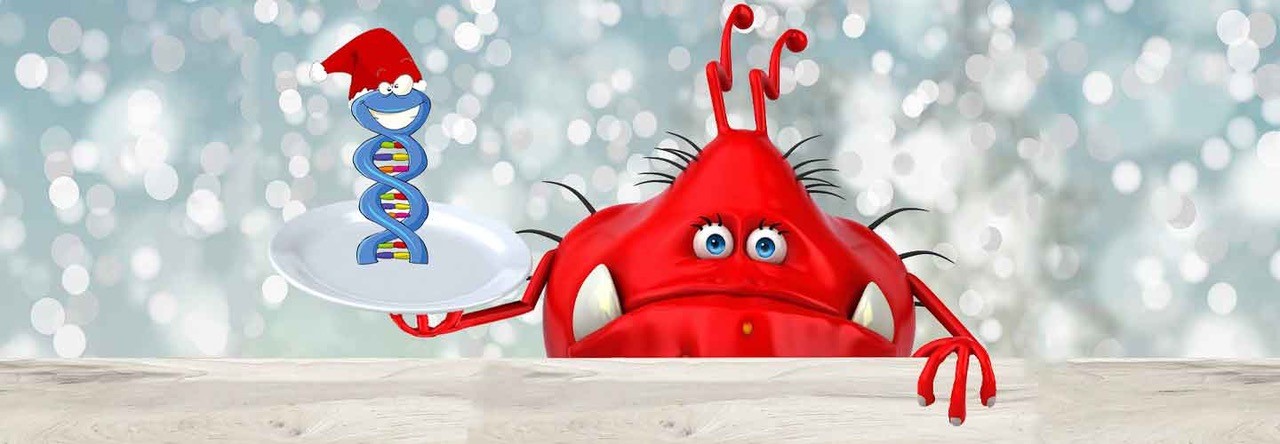Your Mighty Moody Microbiome – Part 17 Do Gut Bugs Love Genetic Testing?
- Home
- Blog

Reader: Welcome to Peak Holiday Season! With the Thanksgiving feast behind us and New Years still a few weeks ahead, what lies directly in front of us now are the parties. From work holiday celebrations to parties with friends, acquaintances, and fellow parents, ‘tis the season to loosen the notch on one’s belt, dig into some holiday treats, and dig out some of the year’s best stories to retell at the right moment. This season tends to gravitate between the two extreme emotions of joviality and stress—but right in the middle is a more subtle emotion, but one we are all too familiar with: awkwardness. For every holiday party, there seems to be one or two people whose behavior or stories are just on the verge of throwing the whole milieu out of whack. All it takes is one unseemly comment—or some improper gesture—for the mood to turn from happy and festive to something less serene.
Holiday parties feature lots of moving pieces—and the difference between a good party and a bad one often comes down to a single weak link in the chain (e.g. Bad food? Bad music? “Bad apple”?). When the pieces work together harmoniously, good memories are made—but when one piece does something unexpected, the whole thing can fall into disarray, leaving you with a sinking feeling in your stomach (pun intended). A similar balance exists in our microbiomes. From diet to genetics, lots of moving pieces play a role in determining the health of our gut bugs, and those microbes in turn play a significant role in the health of both our bodies and our minds. And, like the awkward person at a party who says the wrong thing, when one link in the chain determining your gut wellness doesn’t play its part, your microbiome can fall into dysbiosis and leaky gut (think of trillions of microbes with a bad hangover)—and the health consequences can be significant. This week, we are going to look at two genes that can have a big impact on your microbiome—FUT2 and HLA-DQ2/8. Certain risk gene variants of each of these genes may throw your gut out of whack—but, like a good party host, with the right resources you can take action to protect your microbiome from taking a sickening swoon!
Your Microbiome: 100 Trillion Microbes Partying in your Gut!
Once thought of as an enemy species, the trillions of microbes in our gut (and in our mouths, our skin, vaginal canals) are collectively known as the microbiota, (their genes are known as the microbiome)—and have proven to be so critical to the positive health influences over our day-to-day functioning that some have even called this system a supporting organ. These little microbes help program our immune system; and manufacture neurotransmitters, vitamins, hormones, and food for their neighbors; and aid our digestion and absorption of millions of nutrients that power our cells and preserve our life. When they are fed what they need, they can help keep our trillions of cells in homeostasis and preserve and protect our brain cells. When they’re not getting enough of something—or when they are getting too much—our entire 32 trillion cell body-system gets clogged, our brains get foggy, and our whole body can feel out of whack.
We are just beginning to understand the full impact of our microbiome on our mental and physical health. New studies have shown those trillions of gut bugs play a role in metabolism and weight, as well as in ADHD, depression, autism, Alzheimer’s, Bipolar disorder, and other complex mental illnesses. Treatment for these health concerns may well lie in treatment of the microbiome—indeed, probiotics and prebiotics have both shown promising outcomes to the health of patients (for individuals with a dysbiotic gut, you might say these supplements help get the “microbiome party” back on track). But no part of our body acts on its own—and our gut is no different. There are certain genes that can help keep a microbiome in homeostasis—or make your gut less than healthy over time.
Are Your FUT2 and HLA-DQ2/8 Variants Crashing Your Gut Microbiome Party?
Certain genetic variants analyzed in Genomind’s Mindful DNA Assay may place your microbiome at risk for dysbiosis. As mentioned in prior blogs, a diverse microbiome is generally a healthier microbiome. The reasons for this are still being researched, but one thing we understand right now is that the lack of that diversity can lead to an array of negative conditions. The FUT2 gene affects the surface receptors that allow for the attachment and growth of intestinal microbiota, and provides an important food source for healthy gut bacteria. The “resilient” version of this gene, the “secretors”, support these surface receptors that in turn make a diverse microbiome possible. The “risk” version, or “non-secretors” lead to a lower diversity and dysregulation of gut microbiota. Those with the risk version have a 7-14% increased risk of inflammatory GI conditions like celiac disease or Crohn’s disease. If you know you have a risk allele on this gene, you can begin to take additional steps to promote a healthy gut—a more plant-based diet, and pre- and probiotics being a great place to start.
When it comes to risk alleles in your personal genetic code, the HLA-DQ2/8 gene is somewhat straightforward: the DQ2 and DQ8 haplotypes (haplotypes are genes that are inherited from a single parent) are strongly associated with Celiac disease—and the DQ5 haplotype is carried in 90-95% of all Celiac patients. Celiac disease (and for that matter less severe forms of gluten sensitivity) can have an impact on your whole body, from your energy levels to your digestive processes to how well your brain functions; and the sooner you know whether you suffer from gluten sensitivity, the sooner you can make those gluten-free changes to your diet to feel better.
Your Genes, Your Microbiome, Your Mental Health
Reader, any great party host does their homework when crafting their get-together, particularly when it comes to the guest list. The more you plan, the better chances you have to throw a holiday party that people will truly enjoy and remember. So, too, with your health, as to “who gets invited” into your microbiome community to join the party there: the more you understand about the goings on of your own body, from your genes to your microbiome, the more information you have on hand to make the right health choices that will serve you for the decades to come. Genetic tests like Mindful DNA can help you figure out if your genes are working for or against your microbiome—and from there you can plot a course that can help you epigenetically modify the expression of your DNA predispositions. So, here’s to the holiday season—and to good health well into the new year!
Related Information
- Learn about Genetic Testing
- Learn about Potomac Psychiatry
- Meet Our Doctors
- Contact Potomac Psychiatry
.png?width=144&height=144&name=Untitled%20design%20(34).png)



